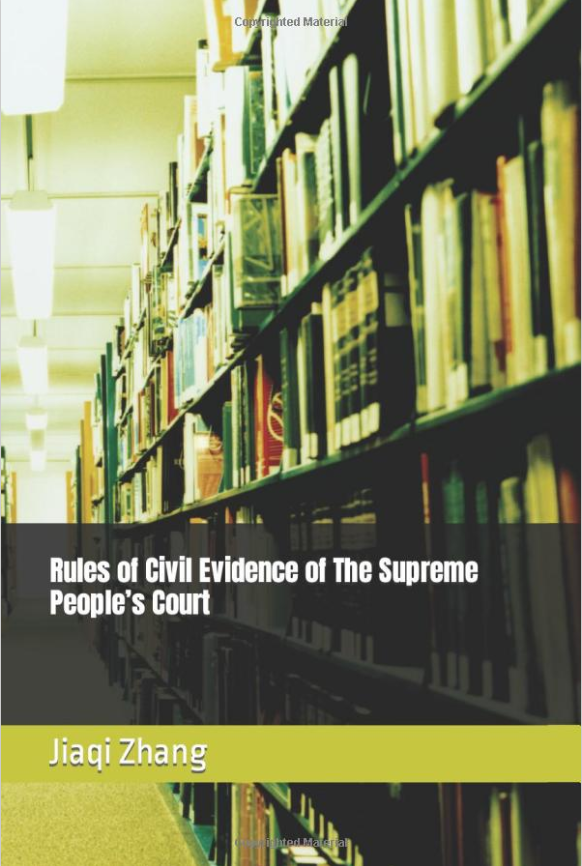
全国服务热线:
18521536308Rules of Civil Evidence of the Supreme People's Court (Selected)
2022-06-25
(版权声明:Rules of Civil Evidence of The Supreme People’s Court由上海金律团翻译有限公司的李恒律师、张佳奇律师合作完成。未经本公司许可,不得擅自复制传播!)

Article 10 A party shall not be required to adduce evidence to prove the following facts:
(1) natural laws, theorems, and axioms;
(2) well-known facts;
(3) facts construed in accordance with the law;
(4) facts inferred from known facts and rules of daily life experience;
(5) facts confirmed by effective arbitration awards;
(6) basic facts confirmed by decrees or orders of people's courts that have become effective in accordance with the law; or
(7) facts proved by valid notarial documents.
Provided, however, that the facts in Items (2) to (5) of the preceding paragraph may be refuted if a party has sufficient evidence to the contrary, and that the facts in Items (6) to (7) may be overturned if the party has sufficient evidence to the contrary.
Article 11 The evidence provided by a party to the people's court shall be original documents or original objects. Where it is necessary for a party to keep in his own possession or it is infeasible to provide the original documents or original objects, their copies or replicas that have been verified by the people's court may be provided.
Article 12 Where movable property is used as evidence, its original object shall be submitted to the people's court. Where the original object is unsuitable for handling or preservation, its replica, video materials, or other substitute may be provided.
After receiving the movable property or its substitute submitted by a party, the people's court shall promptly notify both parties to be present at the people's court or the place where it is preserved for on-site inspection.
Article 13 Where immovable property is used as evidence, the image data of the immovable property shall be provided to the people's court.
Where it deems it necessary, the people's court shall notify both parties to be present for on-site inspection.
Article 14 Electronic data includes the following information and electronic documents:
(1) Information published by web pages, blogs, microblogs, and other network platforms;
(2) Communication information of SMSs, e-mails, instant messaging, communication groups, and other network application services;
(3) User registration information, identity authentication information, electronic transaction records, communication records, login history reports, and other information;
(4) Documents, pictures, audio/video materials, digital certificates, computer programs, and other electronic files; and
(5) Other information stored, processed, and transmitted in digital form that can prove the facts of the case.
Article 15 Where audio-visual materials are used as evidence, the original media for storing the audio-visual materials shall be provided.
Where electronic data is used as evidence, the original electronic data shall be provided. A copy made by the producer of electronic data that is consistent with the original, or a printed copy or other displayable and identifiable output media that is directly derived from the electronic data, shall be deemed the original of the electronic data.

Article 10 A party shall not be required to adduce evidence to prove the following facts:
(1) natural laws, theorems, and axioms;
(2) well-known facts;
(3) facts construed in accordance with the law;
(4) facts inferred from known facts and rules of daily life experience;
(5) facts confirmed by effective arbitration awards;
(6) basic facts confirmed by decrees or orders of people's courts that have become effective in accordance with the law; or
(7) facts proved by valid notarial documents.
Provided, however, that the facts in Items (2) to (5) of the preceding paragraph may be refuted if a party has sufficient evidence to the contrary, and that the facts in Items (6) to (7) may be overturned if the party has sufficient evidence to the contrary.
Article 11 The evidence provided by a party to the people's court shall be original documents or original objects. Where it is necessary for a party to keep in his own possession or it is infeasible to provide the original documents or original objects, their copies or replicas that have been verified by the people's court may be provided.
Article 12 Where movable property is used as evidence, its original object shall be submitted to the people's court. Where the original object is unsuitable for handling or preservation, its replica, video materials, or other substitute may be provided.
After receiving the movable property or its substitute submitted by a party, the people's court shall promptly notify both parties to be present at the people's court or the place where it is preserved for on-site inspection.
Article 13 Where immovable property is used as evidence, the image data of the immovable property shall be provided to the people's court.
Where it deems it necessary, the people's court shall notify both parties to be present for on-site inspection.
Article 14 Electronic data includes the following information and electronic documents:
(1) Information published by web pages, blogs, microblogs, and other network platforms;
(2) Communication information of SMSs, e-mails, instant messaging, communication groups, and other network application services;
(3) User registration information, identity authentication information, electronic transaction records, communication records, login history reports, and other information;
(4) Documents, pictures, audio/video materials, digital certificates, computer programs, and other electronic files; and
(5) Other information stored, processed, and transmitted in digital form that can prove the facts of the case.
Article 15 Where audio-visual materials are used as evidence, the original media for storing the audio-visual materials shall be provided.
Where electronic data is used as evidence, the original electronic data shall be provided. A copy made by the producer of electronic data that is consistent with the original, or a printed copy or other displayable and identifiable output media that is directly derived from the electronic data, shall be deemed the original of the electronic data.
- 联系电话: 18521536308、
- 微 信 号:ZJQ18521536308
- Q Q:3053323860
- 邮 箱:EliteLawyers@outlook.com

扫码关注我们
Copyright 2021 上海金律团翻译有限公司 All Rights Reserved 沪ICP备2022023473号-1
 技术支持:索腾网络
技术支持:索腾网络

